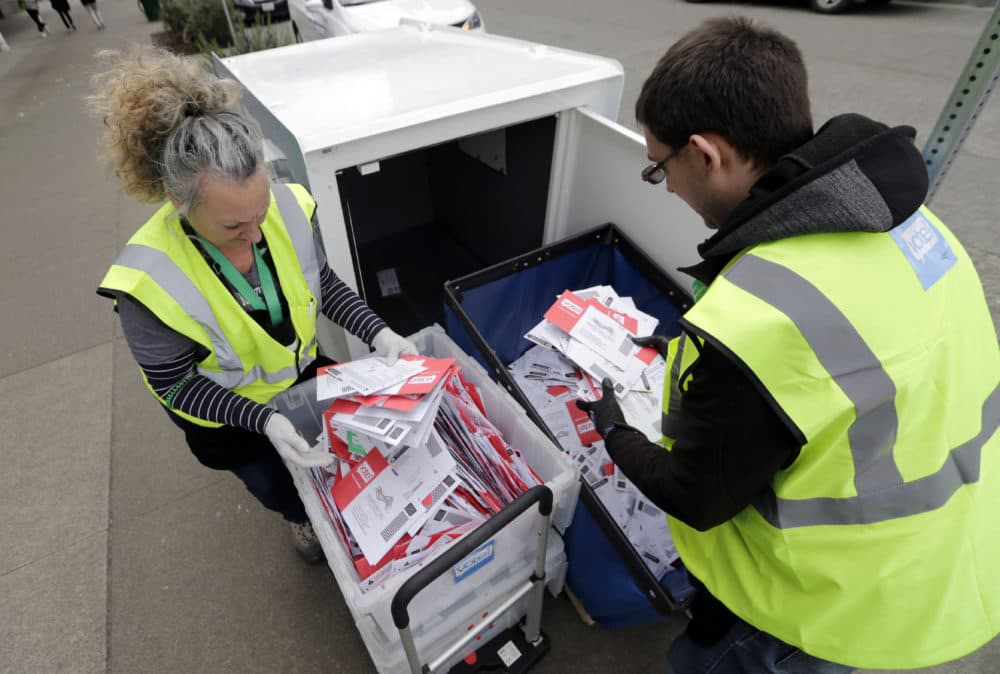Advertisement
Vote-By-Mail Forces In Mass. Grow Anxious About Timeline, Renew Push For Action On Beacon Hill

Legislation outlining vote-by-mail procedures for the September and November elections in Massachusetts "absolutely cannot wait another month," electoral reform advocates said Wednesday as they renewed their push for action on Beacon Hill.
Under normal circumstances, local departments need several months to prepare fully for major statewide elections, particularly in a presidential year. But with the COVID-19 pandemic upending most aspects of public life — and with voters broadly supporting mail-in ballots — reform advocates argued it is critical for lawmakers to quickly find consensus on the myriad proposals before them.
The Sept. 1 primary is less than four months away, and Secretary of State William Galvin wants to begin printing ballots as soon as two weeks from Tuesday.
"Election officials need to prepare for the fall, and they need to do it as soon as possible," said Common Cause Massachusetts Executive Director Pam Wilmot during a virtual press conference alongside about a dozen groups. "We'll see what the Legislature decides, but time is absolutely of the essence and it needs to go now."
At least half a dozen bills that would alter the fall's elections are awaiting legislative action, including one (HD 5075) endorsed by the advocacy coalition that hosted Wednesday's press conference.
That legislation, which was co-authored by Election Laws Committee co-chair Rep. John Lawn and has 88 cosponsors, would send every eligible Massachusetts voter a ballot for the general election without any application requirement. For the primary, voters would need to submit a request for a ballot.
The bill also authorizes clerks to begin scanning in ballots before election day as a way to cope with the increased volume of mail-in votes, expands in-person early voting to two weeks before the primary and three weeks before the general, and trims the voter-registration deadline from 20 days before each election to 10.
"What (election officials) do in the weeks and months prior to elections is plan everything," said Rachael Cobb, who chairs Suffolk University's political science department. "They need as much advance time as possible and more so now because they have to plan for all of these contingencies. Social distancing, polling locations, staff at polling locations — there are so many details that go into planning an election alone, let alone all the protective equipment polling workers will need."
Advertisement
House Speaker Robert DeLeo and Senate President Karen Spilka have not indicated when they plan to take up vote-by-mail legislation. Neither official offered more details when asked about their plans Wednesday.
"... Social distancing, polling locations, staff at polling locations -- there are so many details that go into planning an election alone, let alone all the protective equipment polling workers will need."
Rachael Cobb, chair of Suffolk University's political science department
In a statement, Spilka said she "look(s) forward to working with Senate chair Barry Finegold as the Committee on Election Laws prepares to review bills that prioritize the health and safety of our voters." A DeLeo spokesperson said the House "is engaged in discussions with members, stakeholders and advocacy groups as the committee considers HD 5075."
Lawmakers already granted permission for voters to cast ballots by mail in any annual or special election before June 30 to blunt virus transmission risks.
Secretary of State William Galvin's office did not have final numbers on how widely the option was used in two Senate special elections Tuesday, but said data from midday Tuesday indicated more than 8,600 mail-in ballots had been returned and "that number will likely go up with the last minute arrivals."
Mail-in voting provisions had been in place in five states before the COVID-19 outbreak began in the United States. Since then, 13 others have moved to implement some form of the policy, according to MassVOTE Policy and Communication Manager Alex Psilakis.
While some such as Republican Rep. Marc Lombardo, a member of the Election Laws Committee, have raised concerns about the security of broadly expanded mail-in ballots, the idea enjoys significant public support.
A Suffolk University/WGBH/Boston Globe poll found that 74% of Massachusetts residents support conducting the upcoming state elections entirely by mail.
Many stakeholders outlined support for expanded voting by mail at an Election Laws Committee hearing last week, but there is little consensus on how key details should look. Some bills suggest proactively sending mail-in ballots to every voter, while others would make ballots available only to voters who request them.
Galvin's proposal would allow voters to ask for vote-by-mail materials either electronically or in writing. The secretary also wants to offer early voting for seven days before the primary and 18 days before the general election.
While he does not mirror the coalition's views, Galvin has also described a sense of urgency around the issue: he plans to begin printing ballots as soon as June 2, once nomination papers are submitted.
"We need to have our plan in place very soon, so that my office can order a sufficient number of mail-in ballot materials for voters, and so that voters can start getting those ballots," Galvin said this month when he unveiled his proposal. "The more time our local election officials have to prepare, the more smoothly this election will run for everyone."